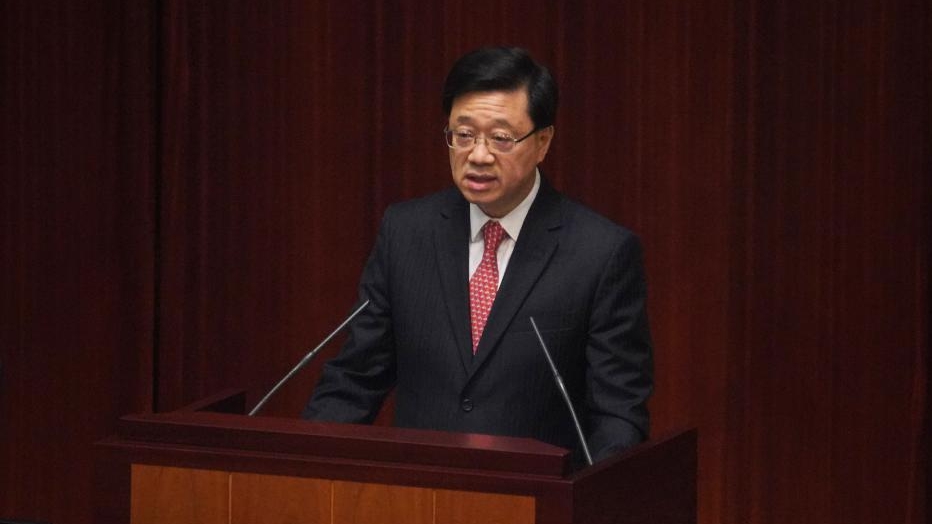00:18

Chief Executive of the Hong Kong Special Administrative Region (HKSAR) John Lee pledged to attract enterprises, investments and talents to enhance competitiveness as he delivered his maiden policy address to the HKSAR Legislative Council on Wednesday.
Read more:
HK Chief Executive rolls out plans to boost economy, finance
"We must be more proactive and aggressive in 'competing for enterprises' and 'competing for talents,'" as Hong Kong is one of the most competitive economies in the world and also serves as an important gateway connecting the Chinese mainland with global markets, Lee said.
Apart from actively nurturing and retaining local talents, the HKSAR government will "proactively trawl the world for talents", he added.
Noting that Hong Kong has its own overriding advantages and enjoys abundant opportunities under the "One Country, Two Systems" principle, Lee said his government will dovetail with national strategies including the 14th Five-Year Plan, the Greater Bay Area (GBA) development and the Belt and Road Initiative to create strong impetus for growth.
Lee also pledged to take steps to unite society. "In the next five years, I will lead the government team to unite and motivate all sectors of the community, and give full play to our fine traditions of inclusiveness, unity and respect for different viewpoints," he said. "We will make our best endeavor, all for better serving our people and better developing Hong Kong."
The report laid out measures to build a solid foundation for security while upholding the principle and leveraging the advantages of "One Country, Two Systems," further improve governance, create strong impetus for growth, earnestly address people's concerns and difficulties in daily life, safeguard harmony and stability, let young people thrive, and combat the COVID-19 epidemic, tell good stories of Hong Kong and scale new heights.
"Over the next five years, I look forward to working with you all to build a more promising and united Hong Kong where people enjoy living and working," said Lee. "Together, let us start a new chapter for Hong Kong advancing from stability to prosperity."
'HK must stay vigilant against security threats'
Lee pointed out the HKSAR must remain vigilant against threats to national security in his address.
"Having restored order from chaos, we must stay alert to threats and dangers, adopt bottom-line thinking, and sustain our efforts in safeguarding national sovereignty, security and development interests in order to guard vigilantly against the recurrence of threats," Lee said.
He said his administration would proceed with preparatory work to enact national security legislation under Article 23 of the Basic Law, as well as enact laws to regulate crowdfunding activities, enhance cybersecurity legislation, and complete a study on how to tackle the issue of "false information."
Meanwhile, the chief executive stressed that civil servants in the HKSAR "should have strong awareness of safeguarding national sovereignty, security and development interests and put the principle of 'patriots administering Hong Kong' into practice."
A healthy, vibrant, caring and livable Hong Kong
Unveiling his plan, Lee vowed to build a more harmonious and stable Hong Kong that better supports the elderly and the disadvantaged, creating a better living environment for all.
Lee set out his plans for a revamped healthcare system focused on prevention, as well as expanding the role of Chinese medicine.
"Our aim is to shift the emphasis of the healthcare system from its current treatment-oriented, hospital-based structure to a prevention-focused, community-based system," he said, adding that additional resources would be invested to promote primary healthcare.
To enhance Hong Kong's vibrancy, Lee introduced that his government will map out a 10-year development blueprint for sports and recreation facilities, providing about 30 diversified facilities by phases.
Lee said his administration would set up district services and community care teams, and delineate the 18 districts in Hong Kong into sub-districts so as to pull together all sectors to take part in building a caring and inclusive Hong Kong.
To strengthen support measures for the elderly, the chief executive announced to set up 16 new neighborhood elderly centers with enhanced service scope, adding the number of subsidized service centers of residential care homes for the elderly would be increased.
Moreover, in order to build a livable Hong Kong, Lee noted the administration would strive to reduce total carbon emissions by 50 percent before 2035 (from the level of 2005) to achieve the goal of carbon neutrality before 2050.
Mainland expresses support
On Wednesday, the Hong Kong and Macao Affairs Office of the State Council and the Liaison Office of the Central People's Government in the HKSAR spoke positively of Lee's policy address.
The policy address fully and faithfully implemented the principle of "One Country, Two Systems" and proposed a series of targeted and creative measures, a spokesperson for the Hong Kong and Macao Affairs Office said.
The report is a vivid reflection of the historic intersection of the new stage of Hong Kong's development and the new journey of the country's development, signifying that the HKSAR will surely achieve greater development in the common endeavor with the country, the spokesperson said.
The liaison office also lauded the report, saying the office will as always support the chief executive and the HKSAR government to govern in accordance with the law, grasp the right direction, bravely break through difficulties and help the region better integrate with the overall development of the country and play a better role in achieving the great rejuvenation of the Chinese nation.
Noting that during the drafting of the policy address, the HKSAR government organized 34 consultation sessions and launched a public consultation website to listen to the views and suggestions of different political groups, associations and sectors, the spokesperson for the liaison office said the move fully reflected the aspirations of the people to determine the aim of governance.